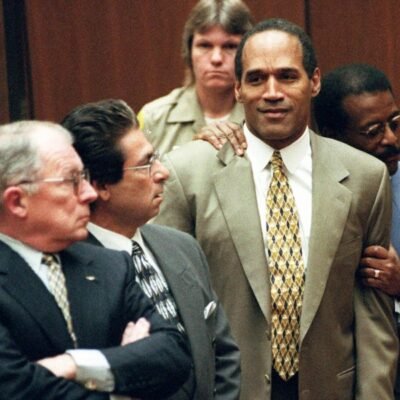Facing long lines and nippy weather, more Nevada Republicans than the Nevada GOP had expected came out to their caucus locations to show support for former President Donald Trump.
Some voters expressed frustration and called the processes disorganized, begging the question: Will the Nevada Republican Party try to do it again?
By Friday morning, 97 percent of the votes had been counted, according to The Associated Press. Trump received 59,545 votes, about 99.1 percent of the total, and Ryan Binkley had received 536 votes, or 0.9 percent.
A little more than 60,000 Nevada Republicans — or 10 percent of the state’s registered Republicans — participated in the caucuses, about 20,000 fewer Republicans than participated in the state-run primary, in which Trump was not on the ballot and no delegates were awarded.
Dan Lee, a political science associate professor at UNLV, said Thursday night’s turnout, which was toward the top end of what he was expecting, “is reflective of Trump having strong support among Republican voters in Nevada.”
Turnout was less than the 2016 Republican caucuses, which had around 75,000 participants, but Lee said that is to be expected, as 2016 was considered a more competitive race. Trump had won those caucuses, even as a political newcomer, with about 45 percent of the votes.
But what does the caucus turnout signify for November? While it might show strong Republican backing for Trump, Lee said the issue with Trump, and candidates like him, is how they perform with independent voters and moderates in Nevada, which make up the largest voting bloc in the state.
Out of the state’s 1.9 million voters, nearly 33 percent are nonpartisan, 31 percent are Democrats and 29 percent are Republicans, according to January voter registration statistics from the secretary of state’s office.
During the 2022 midterms, candidates aligned similarly to Trump weren’t able to win elections, Lee said.
Caucus chaos
With a larger turnout than anticipated, some voters expressed frustration over how long the process took.
Margaret Watkins, a Las Vegas resident, said she tried to vote at Sandra Lee Thompson Elementary School but could not find a disabled parking space that she required.
“It’s very disappointing,” she said in a phone interview with the Review-Journal on Thursday night. She was going to vote for Trump, and while she understood that he was going to win the caucuses regardless, “it still makes me feel good knowing that I’m a part of the voting process and that I can add to his victory and his numbers. When you can’t vote, it’s very disconcerting.”
Henderson resident Joe Hughes and his wife went to the caucus at Green Valley High School. They arrived before 5 p.m. but were not able to vote because there were so many people in line standing shoulder to shoulder, with only four caucus workers to check them in, he said. He said the caucus was chaotic and the process was in disarray.
“We were very disappointed in the whole situation,” Hughes said in a phone interview Friday. “We wanted to give our support and our vote to President Trump.”
Regardless, Hughes does not think the party should give up on caucuses. It would have been a nice experience if it was just organized better, he said.
Nevada GOP Chair McDonald and Clark County Republican Party Chairman Jesse Law are aware there were issues during the caucuses, and McDonald has been taking “constructive criticism” on it, he said.
“If I can make it better for the next chairman, I’ll take it,” he said, adding that he is doing a postmortem of how the caucuses went and will include what the pitfalls were. Overall, however, he said the caucuses were a success and that he is proud of the chairmen in Nevada’s 17 counties who operated the caucuses.
“Last night, clearly the turnout was a lot larger than anybody expected. And they handled it,” he said.
McDonald and Law were not aware of any voter being turned away at the caucus locations, although Law understood that some people left before voting. At 7:30 p.m., caucus workers gave the last person in line a card informing them they were last, McDonald said.
Clark counting
Law said running the caucuses was tough and tiring. He had to send more ballots to caucus locations, but not all of them ended up needing them, he said. He also sent runners to help expedite the check-ins at certain locations.
Some sites had improved their check-in speeds, while others could not speed up, Law said, and caucus workers tried to make accommodations for people who were elderly or disabled as it started to get cold, he said.
“There were sites that were really, really great with it,” Law said. “Other sites … it was just, it was just too much for them.”
To count the results, elected precinct chairs and secretaries counted the ballots and looked over each other’s shoulders, Law said. They went through looking for votes for Binkley, and then the remaining were votes for Trump, Law said. “That in and of itself made it extremely easy,” he said.
Caucuses down the road?
The caucuses were pushed for and organized by Nevada Republicans who have claimed that Nevada’s elections are insecure. They touted unfounded allegations that the 2020 election was stolen from Donald Trump and that the 2021 Nevada law that allows for mail ballots to be sent automatically to every voter was a root cause of a fraudulent election. McDonald and Law are two of the six Republican electors who had signed electoral certificates declaring Trump the winner of Nevada in 2020. (The six electors were indicted with charges relating to forgery. They pleaded not guilty and requested the case be dismissed).
Thursday’s caucuses allowed them to operate an election in a way they say is more secure, with the use of voter ID and paper ballots.
When asked if the Nevada GOP would continue to caucus or if it would use the state-run presidential primary in future elections, McDonald said changes needed to be made to the state’s election processes. His biggest goal is to have voter ID implemented, an initiative Republican Gov. Joe Lombardo has pushed unsuccessfully.
In 2015, McDonald had tweeted that he thought primaries were better than caucuses but that was before mail-in ballot were sent to every voter. “I still feel the same way now,” he said.
“If we can make it good for everybody so there’s no question about the electoral system, it’s a win for everybody,” he said.
Law said people should be allowed to organize, which caucusing allows, rather than take voters further away from the process through a primary.
“I have ideological reasons to want to keep this thing this way,” Law said, “but I have some very realistic positions after seeing the good, the bad, the ugly, but, you know, we would have to make some improvements.”
He would like to see technology be implemented in a future caucus to ease the check-in process, ideally a similar system that was used at the CES convention Law had attended that allowed for individual credentials and scanning.
Contact Jessica Hill at jehill@reviewjournal.com. Follow @jess_hillyeah on X.




